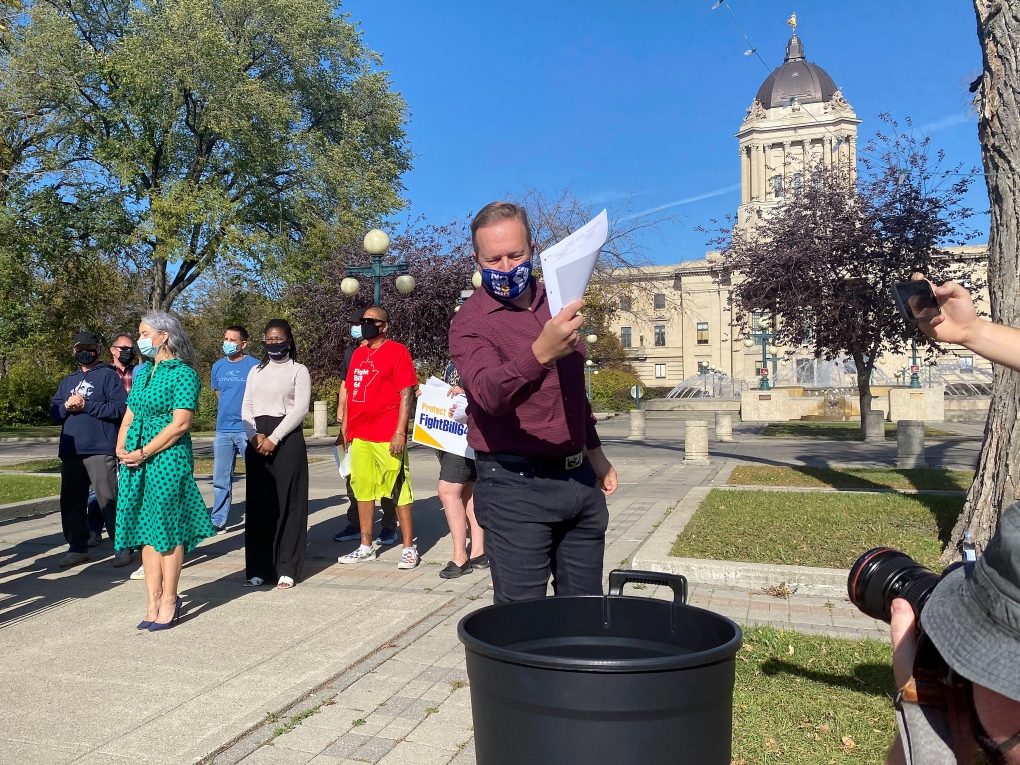Manitoba government withdraws controversial bills during short legislature sitting
 Kevin Rebeck, president of the Manitoba Federation of Labour, throws a labour bill in a trash can outside the Manitoba legislature, in Winnipeg, Wednesday, Oct. 6, 2021. Rebeck joined the Opposition New Democrats in celebrating the fact the Progressive Conservative government withdrew five bills that were scheduled to become law this fall. THE CANADIAN PRESS/Steve Lambert
Kevin Rebeck, president of the Manitoba Federation of Labour, throws a labour bill in a trash can outside the Manitoba legislature, in Winnipeg, Wednesday, Oct. 6, 2021. Rebeck joined the Opposition New Democrats in celebrating the fact the Progressive Conservative government withdrew five bills that were scheduled to become law this fall. THE CANADIAN PRESS/Steve Lambert
Manitoba's Progressive Conservative government withdrew five bills Wednesday that had faced stiff opposition and were set to become law this fall.
"Ultimately, I think it's not a sign of weakness when a government listens to people. It's a sign of strength," Premier Kelvin Goertzen said.
The most controversial bill was one proposing an education overhaul that would have eliminated all elected English-language school boards. Hundreds of people signed up to speak against the bill at public hearings and lawn signs denouncing it sprouted up across the province.
Another bill would have paved the way for more private liquor sales. A third would have eliminated the automatic right to binding arbitration in labour disputes. The fourth would have made it easier to remove blockades of highways and other infrastructure, while the fifth would have allowed the government to bypass public regulatory hearings and set electricity rates unilaterally.
Goertzen, who was chosen by caucus to take over after former premier Brian Pallister retired last month, said wiping out the bills leaves a clean slate for the next Tory leader, who is to be chosen by party members on Oct. 30. Former health minister Heather Stefanson and former Conservative member of Parliament Shelly Glover are the two candidates.
The winner will get to decide which, if any, of the bills might be revived, Goertzen said. There was public support for the idea of more private liquor sales, he added.
The Opposition New Democrats, who prevented the bills from passing in the spring, celebrated the government's move at a news conference at which people threw copies of the proposals into a garbage can.
NDP Leader Wab Kinew said the next Tory leader and premier might bring back all of the bills.
"They're still going to bring those back, regardless of who is the next leader of the PC Party. We think that's wrong," Kinew said.
Support for the Tory government dropped sharply in opinion polls as the COVID-19 pandemic grew and discontent over education reform erupted.
Kinew said if he is elected premier in the election to be held in 2023, he would not set electricity rates unilaterally, but would revert to open hearings before the Public Utilities Board.
He would not commit to ensuring annual hydro rate increases would be less than the 2.9 per cent set by the Tories last year. Traditionally, the board has allowed increases of between three and four per cent.
"We're in favour of a public process," Kinew said
This report by The Canadian Press was first published Oct. 6, 2021.
CTVNews.ca Top Stories

BREAKING Israel attacks Iran, Reuters sources say; drones reported over Isfahan
Israel has attacked Iran, three people familiar with the matter told Reuters, as Iranian state media reported early on Friday that its forces had destroyed drones, days after Iran launched a retaliatory drone strike on Israel.
American millionaire Jonathan Lehrer denied bail after being charged with killing Canadian couple
American millionaire Jonathan Lehrer, one of two men charged in the killings of a Canadian couple in Dominica, has been denied bail.
Nearly half of China's major cities are sinking, researchers say
Nearly half of China's major cities are suffering 'moderate to severe' levels of subsidence, putting millions at risk of flooding especially as sea levels rise.
Prince Harry formally confirms he is now a U.S. resident
Prince Harry, the son of King Charles III and fifth in line to the British throne, has formally confirmed he is now a U.S. resident.
Judge says 'no evidence fully supports' murder case against Umar Zameer as jury starts deliberations
The judge presiding over the trial of a man accused of fatally running over a Toronto police officer is telling jurors the possible verdicts they may reach based on the evidence in the case.
Health Canada to change sperm donor screening rules for men who have sex with men
Health Canada will change its longstanding policy restricting gay and bisexual men from donating to sperm banks in Canada, CTV News has learned. The federal health agency has adopted a revised directive removing the ban on gay, bisexual and other men who have sex with men, effective May 8.
Colin Jost names one celebrity who is great at hosting 'Saturday Night Live'
Colin Jost, who co-anchors Saturday Night Live's 'Weekend Update,' revealed who he thinks is one of the best hosts on the show.
Sports columnist apologizes for 'oafish' comments directed at Caitlin Clark. The controversy isn't over
A male columnist has apologized for a cringeworthy moment during former University of Iowa superstar and college basketball's highest scorer Caitlin Clark's first news conference as an Indiana Fever player.
'Shopaholic' author Sophie Kinsella reveals brain cancer diagnosis
Sophie Kinsella, the best-selling author behind the 'Shopaholic' book series, has revealed that she is receiving treatment for brain cancer.
































